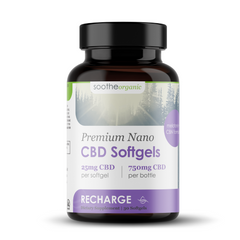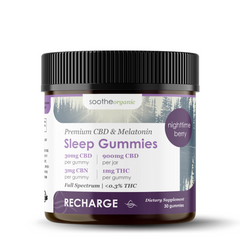In today's fast-paced world, a good night's sleep can often feel like an elusive dream - particularly for those affected by insomnia. Affecting millions all over the globe, this troublesome disorder can make everyday life a nightmare, leaving people feeling exhausted during the day and restless at night.
Because of that, it is no surprise that people are searching for ways to naturally improve their sleep patterns, with many turning to CBD as a solution. But how effective is CBD in the battle against insomnia? Could it be the key to unlocking a restful night's slumber?
Read on to discover the potential benefits of using CBD oil to promote a better night's sleep and learn about various methods of incorporating it into your daily routine!
Key Takeaways:
Insomnia is a sleep disorder affecting millions of people, with various causes such as anxiety, depression, chronic pain, and lifestyle choices. Left untreated, it can increase stress levels, decrease productivity, and impair cognitive function.
CBD (cannabidiol) is a non-intoxicating compound found in hemp plants that has been gaining attention for its potential beneficial properties, including supporting physical and mental well-being.
Preliminary studies suggest that CBD may help support quality sleep by influencing the body's endocannabinoid system (ECS), crucial in maintaining physiological processes like mood, appetite, and sleep regulation.
Early research indicates that CBD might help reduce anxiety and stress, as well as alleviate physical pain or discomfort, which are common factors contributing to insomnia.
When choosing a CBD product for sleep support, select one from a reputable manufacturer that provides third-party lab reports. Consider trying products that combine CBD with melatonin for enhanced effects.
To use CBD for sleep improvement, take it at least an hour or two before bedtime and start with a smaller serving size to avoid potential side effects.
Understanding Insomnia: Causes and Symptoms
Insomnia is a sleep disorder characterized by difficulty falling and staying asleep, resulting in poor sleep quality and diminished well-being. It is estimated that up to 30% of Americans suffer from this debilitating condition, making it a significant public health concern.

There exist various factors contributing to the development of insomnia, ranging from underlying mental or physical conditions like anxiety, depression, chronic pain, or sleep apnea to external influences such as certain medications or lifestyle choices—for instance, working night shifts or consuming caffeine before bedtime.
Common symptoms associated with insomnia encompass:
Difficulty initiating sleep at night
Frequent awakenings during the night
Challenges returning to sleep after waking up
Morning fatigue upon waking
Daytime symptoms like exhaustion, irritability, or difficulty concentrating
Dependence on sleeping aids or alcohol to induce sleep
Left untreated, insomnia can precipitate several adverse outcomes, both in the short and long term. These may encompass heightened stress levels, reduced productivity, compromised cognitive function, and even depressive tendencies. In severe instances, it may even culminate in accidents or injuries due to sleep deprivation.
For those averse to relying on conventional sleep medications, natural alternatives like CBD often emerge as appealing options to facilitate a restful night's sleep. But does CBD genuinely offer relief for insomnia?
The Science Behind CBD
CBD, short for cannabidiol, is a naturally occurring compound found in hemp plants, categorized as a cannabinoid. Unlike THC (tetrahydrocannabinol), CBD doesn't induce a psychoactive "high," and it's drawing increasing attention for its potential health benefits. Research indicates that CBD may offer comprehensive support for both physical and mental well-being.
One area of particular interest in recent years is CBD's potential impact on sleep. Early studies suggest that CBD could aid in promoting better sleep quality by interacting with the body's endocannabinoid system (ECS). This intricate network of cell signaling is vital for regulating various physiological processes, including mood, appetite, and sleep patterns.
3. How Does CBD Interact With the Endocannabinoid System?
The Endocannabinoid System (ECS) comprises three essential elements: endogenous cannabinoids, receptors, and enzymes. Its fundamental role is thought to be the regulation of balance or homeostasis within the body.
Endocannabinoids are naturally produced substances akin to cannabinoids found in plants such as CBD. They interact with particular receptors spread throughout the body, namely CB1 and CB2 receptors. CB1 receptors are predominantly situated in the brain, while CB2 receptors are mostly found in the immune system.

Although the precise mechanisms by which the ECS system interacts with CBD are not yet fully understood, CBD may inhibit the enzymes that break down endocannabinoids, thus prolonging their effects. In other words, CBD may help to enhance and extend the natural benefits of the ECS system.
- CBD's Potential Benefits for Sleep Regulation
Research on the relationship between CBD and sleep is still in its early stages; however, preliminary findings suggest that CBD may help improve sleep quality by addressing some of the underlying causes of insomnia.
For instance, early research has indicated that CBD might help reduce anxiety and stress – two common factors that contribute to sleep disturbances and may lead to insomnia. A 2019 study conducted on a group of 72 adults experiencing anxiety and poor sleep found that CBD use had a positive impact on almost 80% of the patients, with over 66% showing improved sleep scores.
As insomnia may be caused by prolonged physical pain or discomfort, CBD's potent anti-inflammatory and pain-relieving properties may also help to promote more restful sleep.
Of course, as mentioned above, more research is needed to fully understand the extent of CBD's impact on sleep regulation. However, even these early findings are promising and offer potential hope for those struggling to rest at night.
- Selecting the Right CBD Product for Insomnia
With the growing popularity of CBD and an abundance of products on the market, choosing the right one for your specific needs can be challenging. As such, it's important to be mindful of a few key factors when selecting a CBD product for sleep support.
Always source your CBD products from a reputable manufacturer that provides third-party lab reports. This will ensure that the product contains the amount of CBD advertised and is free from harmful contaminants. Using CBD to promote a good night's rest requires a potent product, and low-quality solutions might not provide the desired results.
If traditional CBD products aren't enough to help you get the rest you need, consider trying CBD products with melatonin, like special CBD softgels or CBD gummies. Melatonin is a natural hormone that plays a role in regulating the body's sleep-wake cycle. However, sometimes the body doesn't produce enough of it, which can lead to sleep disruptions.
Combining the relaxation-promoting effects of CBD with the sleep-supportive benefits of melatonin may offer more pronounced effects than taking CBD alone.
- How to Use CBD for Sleep Improvement?
Now that you know more about the potential impact of CBD on insomnia, you might be wondering how to use it to improve your sleep quality. Generally speaking, there are a few rules of thumb to follow when using CBD for sleep:
Remember always to take your CBD product of choice at least some time before bedtime. Unless you vape or smoke it, it can take up to an hour or two for the effects of CBD to be felt.
If you're using a CBD product for the first time, it's best to err on the side of caution and start with a smaller serving size. Although CBD is considered to be very well-tolerated (even in large doses), mild side effects like dry mouth are possible. You don't want to be dealing with these while trying to sleep.
- Talk to a Medical Professional
When using CBD to promote better sleep patterns, consider talking to a medical professional - they can advise you on the best possible course of action and help you avoid any potential risks.

Above all, remember that CBD is not a replacement for good sleep hygiene and provides the best results when used as an addition to your healthy lifestyle arsenal. Creating and following a regular sleep schedule, avoiding alcohol or caffeine in the evenings, and keeping a cool and comfortable bedroom environment are all important factors in battling insomnia.
CBD may offer a natural way to support a good night's rest, but it's not a miracle cure. Use it in conjunction with other healthy sleep habits for the best results!
Conclusion
The relationship between CBD and insomnia is a promising area of research that has the potential to benefit millions of people who struggle with sleep disorders. While more scientific studies are needed to fully understand the intricacies of this interaction, early findings suggest that CBD may be a valuable tool in promoting better sleep quality by addressing some of the underlying causes of insomnia.
When selecting the right CBD product for your needs, ensure you choose a reputable manufacturer and consider trying products that combine CBD with melatonin for enhanced effects. If possible, consult a medical professional to find the right CBD dose and get advice tailored to your specific situation.
Ultimately, CBD should be used as part of a holistic approach to sleep improvement, including maintaining healthy sleep habits and lifestyle choices. By considering all these factors together, you may be well on your way to achieving the restful slumber you deserve! We Wish You Well!
CBD bath bombs, CBD effects, CBD effects, CBD hair growth, CBD energy drinks, CBD sleep apnea, MLB CBD, Best sleep gummies, THCV gummies, 750mg gummies, CBD sports cream, CBD cream 1000mg, Wyoming weed laws, CBD store Casper, CBG tincture, gummies for sleep, CBD softgels 25mg, delta nine gummies, sleep gummies, CBD Wyoming, CBD store Casper, Focus gummies, THCv gummies effect, healing salve, best delta nine gummies, sleep gummies for adults, vegan gummies, CBD softgels, best THCv gummies, full spectrum vs. broad-spectrum CBD, muscle rub, organic sleep gummies, dispensary near me, 24/7 cigarettes CBD oil, CBD benefits, CBD dosage, CBD side effects, CBD legality






